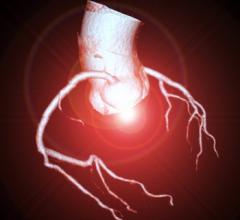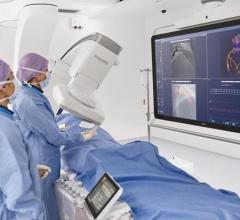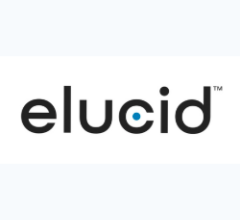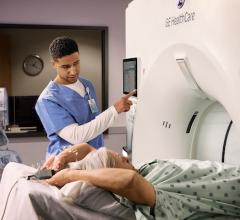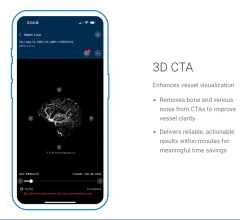
Coronary CT angiography images of a coronary artery depicting the perivascular fat attenuation index (FAI) before and after psoriasis biologic drug therapy at one-year follow-up. Patients had excellent response to biologic therapy, showing clear reductions in the inflammation in plaques that cause heart attacks and stokes. Image from the Oxford Academic Cardiovascular CT Core Lab and Lab of Inflammation and Cardiometabolic Diseases at NHLBI.
July 31, 2019 — Researchers found anti-inflammatory drug therapies used to treat moderate to severe psoriasis can significantly reduce coronary inflammation in patients with the chronic skin condition. Scientists said the findings are particularly notable because of the use of a novel imaging biomarker, the perivascular fat attenuation index (FAI), that was able to measure the effect of the therapy in reducing the inflammation.
The study was published online today in the Journal of the American Medical Association (JAMA) Cardiology, has implications not just for people with psoriasis, but for those with other chronic inflammatory diseases, such as lupus and rheumatoid arthritis. These conditions are known to increase the risk for heart attacks and strokes. The study was funded by the National Heart, Lung, and Blood Institute (NHLBI), part of the National Institutes of Health (NIH).
“Coronary inflammation offers important clues about the risk of developing heart artery disease,” said study’s senior author Nehal N. Mehta, M.D., FAHA, a cardiologist and head of the Lab of Inflammation and Cardiometabolic Diseases at NHLBI. “Our findings add to the growing body of research that shows treating underlying inflammatory conditions may reduce the risk of cardiovascular diseases."
The researchers analyzed 134 patients who suffered moderate to severe psoriasis and had not received biologic treatment for at least three months before starting on the study’s therapy. Fifty-two of these patients who chose not to receive the biologic therapy, were treated with topical or light therapies only and served as the control group. The participants are from an ongoing, prospective cohort study, the Psoriasis Atherosclerosis Cardiometabolic Initiative cohort at the NIH.
Coronary artery inflammation particularly affects perivascular fat (the fat tissue surrounding arteries). It changes its composition, making it attenuated, or less fatty, as captured by the perivascular fat attenuation index (FAI). Researchers are using this index in the current study used to measure the effects of the biologics on coronary inflammation.
“FAI is a new method of analyzing CT scans that can predict a patient’s risk of fatal heart attacks and other cardiac events years in advance, and independent of other traditional risk factors for heart disease,” explained study co-author Charalambos Antoniades, M.D., professor of cardiovascular medicine at Oxford University. “In fact, our research has found that an abnormal perivascular FAI was linked to a six- to nine-fold increased risk of major adverse cardiovascular events.”
Study Used CT to Assess Psoriasis Drug Impact on Coronary Plaques
The 134 patients, all of whom had low cardiovascular risk, underwent computed tomography (CT) scans at the start of the study and again a year later to assess coronary inflammation using the perivascular FAI. Researchers found a significant reduction in coronary inflammation among those receiving biologic therapy, but there was no change in the control group. Even patients with pre-existing coronary artery plaque saw a reduction in coronary inflammation following biologic therapy.
“After seeing the predicting value of the perivascular FAI for cardiac events, a key lingering question was if we could modify it using anti-inflammatory interventions. As far as we know, our study is the first to assess potential effects of biologic therapy on coronary inflammation using the measure,” said Mehta.
The researchers believe that the strength of the perivascular FAI in predicting the risk of future cardiac events could guide therapeutic decisions for individual patients, promoting a more personalized medicine approach to care.
“To see a reduction in coronary plaque after just one year of biologic therapy alone is incredible and very assuring. It’s the first time we’re seeing treatment of a skin disease with biologic therapy have an impact specifically on plaque in the coronary,” Mehta said when he presented the preliminary, first-in-human findings at the 2018 Society for Cardiovascular Angiography and Interventions (SCAI) annual meeting. "This also opens the door for us to look at other disease states and see how anti-inflammatory therapy options could impact coronary plaque over time.”
Read more about that presentation in the article "Psoriasis Therapy Can Reduce Coronary Plaque."
Psoriasis and Atherosclerosis Both Are Inflammatory Responses
Psoriasis, a common skin disease affecting 3-5 percent of the U.S. population, is associated with heightened systemic inflammation, which elevates risk of blood vessel disease and diabetes. Inflammation occurs when the body’s defensive mechanism kicks in to ward off infection or disease, but this mechanism can turn against itself when triggered, for instance, by excess low-density lipoproteins (LDLs) that seep into the lining of the arteries.
The resulting inflammatory response in arteries can lead to the formation of vulnerable plaques, which have an unstable necrotic core. When the core is exposed to the blood, the body interprets it the same way as if there was a cut, triggering the clotting cascade and the formation of blood clots. These can block arteries leading to heart attacks or strokes. Inflammation puts 20-30 percent of the U.S. population at risk for these kinds of events.
About the National Heart, Lung, and Blood Institute (NHLBI)
NHLBI is the global leader in conducting and supporting research in heart, lung, and blood diseases and sleep disorders that advances scientific knowledge, improves public health, and saves lives. For more information, visit https://www.nhlbi.nih.gov.
About the National Institutes of Health (NIH)
NIH, the nation's medical research agency, includes 27 Institutes and Centers and is a component of the U.S. Department of Health and Human Services. NIH is the primary federal agency conducting and supporting basic, clinical, and translational medical research, and is investigating the causes, treatments, and cures for both common and rare diseases. For more information about NIH and its programs, visit www.nih.gov.
Read the related article in this technology from SCCT 2020 — Low-attenuation Coronary Plaque Burden May Become Next Big Cardiac Risk Assessment
Reference:
Youssef A. Elnabawi, Evangelos K. Oikonomou, Amit K. Dey, et al. Association of Biologic Therapy with Coronary Inflammation in Patients with Psoriasis as Assessed by Perivascular Fat Attenuation Index. JAMA Cardiol. Published online July 31, 2019. doi:10.1001/jamacardio.2019.2589.

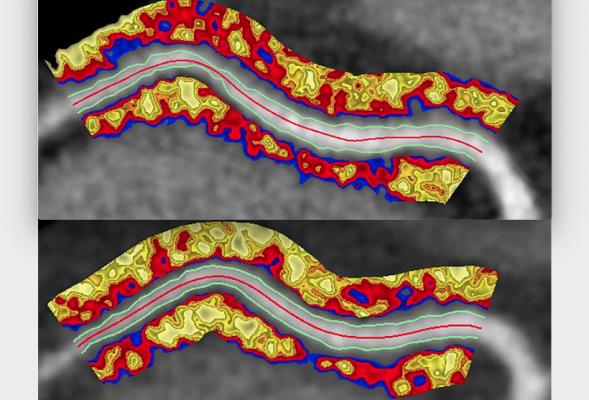
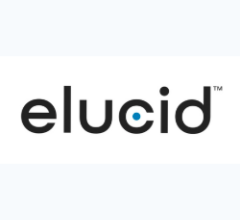
 January 09, 2026
January 09, 2026 

